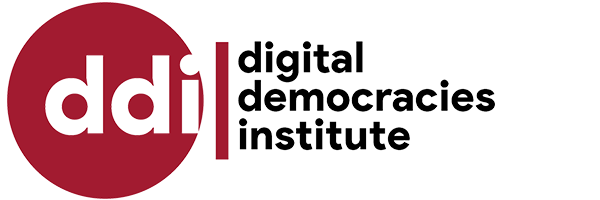Jonathan Gray came to talk to the Institute about the inspiring ways that the incredibly interdisciplinary Public Data Lab conducts their projects, and he sold it SO WELL that I think we all came away with new ways of thinking about our own work. He also said that they are looking for opportunities to collaborate with us on shared interests…I can only imagine that they will now be inundated with requests following such an enlightening talk!
He started off by describing what the Public Data Lab is, ostensibly an “interdisciplinary network exploring what difference the digital makes in attending to public problems.” The lab, which started in 2016, is a network of researchers working together on shared projects, currently based mostly in Europe but not exclusively, hence the talk with us today. It doesn’t have a central location, but assembles at different locations that collaborating researchers are. The collaborators have a shared sensibility of digital research, and are from varied fields of social and cultural research such as science and technology studies, new media studies and design studies. As Jonathan describes “it is very much an endeavour grounded in the humanities”.
Jonathan described how “lightness” is one of their operating principles, which gives them freedom from not having to depend on grant writing, or operational limitations, instead they are able to just bring people together with similar curiosities on experiential methods. One of the first examples of projects from the Lab was the ‘Field Guide to Fake News,’ which broadens out from a focus on the truth or falsity of troubling content to the media infrastructures involved in its circulation. He also referred to the ‘Save our Air’ project about air pollution in society, moving from looking at data on particulate matter, to data practices about the settings and situations of air pollution, aiming support different kinds of social and political engagements with data and the issue. The final example of the ‘Fog of Finance’ project which created an atlas of offshore finance exploring how to map troubling flows, whilst also affirming the uncertainty of partial and provisional data. The project was a collaboration with the Tax Justice Network and other campaign organisations.

He noted that the Lab is “trans-national, trans-institutional, and trans-disciplinary” which provides for a very mobile and generative mode of working. One thing that has been a consistent theme is “modification” was often a starting point, as multiple projects have looked at how methods could be taken apart and put back together again in a different way, which may lead to different kinds of questions or ways of understanding the issue or problem that was taken as a starting point.
 One of the big projects they have recently completed has been The Data Journalism Handbook: Towards a Critical Data Practice edited by Liliana Bounegru and Jonathan. It contains 50 chapters from 74 researchers and practitioners about data journalism, which it examines and unpacks as a kind of “curatorial craft.” It contains twelve challenges for critical data practice, which are relevant not only for data journalists, but also researchers, students and others who work with data.
One of the big projects they have recently completed has been The Data Journalism Handbook: Towards a Critical Data Practice edited by Liliana Bounegru and Jonathan. It contains 50 chapters from 74 researchers and practitioners about data journalism, which it examines and unpacks as a kind of “curatorial craft.” It contains twelve challenges for critical data practice, which are relevant not only for data journalists, but also researchers, students and others who work with data.
One of the challenges for the Lab is how to do things together when everyone is always already over-committed. In thinking on how to do this, their practice is more focused on alignment rather than adding to existing commitments. This means that projects often tend to work across what people are committed to (practically, politically, personally), in order to find intersections, work more collaboratively and enrich perspectives rather than “adding more”. I really liked how Jonathan described the process of making project pitches as a transformation, moving from a position where you start with questions to seeing how different methods and collaborations might project forwards and change what the outcomes and outputs might be. This process of collective inquiry has been very generative and productive so far, and seems to be something that we can learn from at the DDI. He referred to a new book Reassembling Scholarly Communications that he has edited together with Martin Eve which is described as “a critical inquiry into the politics, practices, and infrastructures of open access and the reconfiguration of scholarly communication in digital societies”, a book which has been developed in parallel to the Public Data Lab and which explores similar and overlapping themes about research in society.
I really liked throughout Jonathan’s presentation how much he referred to ideas and concepts, principles and ways of working, that draw on those of colleagues and other researchers. It really spoke to the collaborative aesthetic that underlies the Lab itself. He ended by saying that “the broader significance to this way of working is changing the sort of spaces and the sorts of collaborative processes which are available and recognized and affirmed within university contexts.” I really look forward to seeing how we can work together and learn from each other, and being part of the projects and activities that the Public Data Lab assembles.
Here are some links to other projects that Jonathan referred to which might be of interest:

